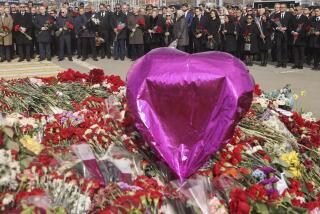China says terrorist cell broken up; 10 arrested
- Share via
Reporting from Beijing — Chinese officials announced Thursday that they had broken up a cell of Islamic separatists from the restive Xinjiang region who they said represented the “main terrorist threats” facing the country.
At a news conference in Beijing, public security officials displayed photographs of knives, hatchets, bullets and homemade explosives said to have been confiscated between July and October from members of the East Turkestan Islamic Movement. East Turkestan is the name used by many ethnic Uighurs for Xinjiang, in northwestern China.
“This once again proves that the East Turkestan Islamic Movement and other organizations are the main terrorist threats our nation faces presently and in the near future,” said Wu Heping, a spokesman for the Public Security Ministry.
Ten people were arrested, two of whom were identified as ringleaders: Abudurexiti Abulaiti, 42, and Yiming Semair, 33. The men were said to have connections to an international terrorist who had been “dispatched from abroad” to Xinjiang.
The announcement elicited skepticism from human rights advocates, who say China has a history of inflating terrorism threats to justify repression of minorities. The timing of the news conference was also questioned, coming shortly before the one-year anniversary of massive ethnic riots in Xinjiang’s capital, Urumqi, where about 200 people, mostly Han Chinese, were killed.
“There is no disputing there are violent people who advocate violence as a mode of opposing Chinese rule in Xinjiang, but it is hard to have confidence in these pronouncements by the Chinese government when they have a record of exaggerating their claims and using torture to obtain confessions,” said Nicholas Bequelin, an expert on Xinjiang and researcher with Human Rights Watch. He said the collection of weapons displayed, which included penknives, looked “pretty homegrown.”
Some analysts believe that the East Turkestan Islamic Movement does not exist as an organized terrorist group, but that there are different ad hoc groups working against China. One leader of the anti-Chinese movement, Abdul Haq Turkistani, is thought to have been killed Feb. 15 in a U.S. airstrike against Taliban commanders in Pakistan’s tribal areas.
Singapore-based terrorism expert Rohan Gunaratna, who recently published a book on ethnic violence in China, said the Islamic militant movements were not as strong as they had been in the past, but still posed a danger.
“They are still a significant threat,” Gunaratna said. “There are new cells that have formed since the Urumqi riots. They may be rudimentary and not have the historical experience, but there certainly are cells that are planning and preparing attacks.”
Those arrested were said by the Chinese to be involved in a series of attacks around the time of the 2008 Summer Olympics in Beijing. Days before the Games, two men rammed a dump truck into a group of policemen who were jogging in the western city of Kashgar, killing 17 people. A week later, 12 people were killed with knives and homemade explosives in the oasis town of Kuqa.
Officials said Thursday that the same group had been planning similar attacks around Xinjiang last summer in the aftermath of the riots.
One particularly controversial aspect of the latest crackdown is that three of the 10 people arrested had been among 20 Uighurs extradited in December from Cambodia, where they had sought refuge with the help of Christian missionaries. The extradition raised a howl of protest from human rights groups that accused China of pressuring Cambodia to turn over the Uighurs.
On Thursday, public security spokesman Wu defended the extradition, saying that those who were cleared of wrongdoing had been released and that the government had helped a woman and two children get settled again “in line with humanitarian sentiment.”
More to Read
Sign up for Essential California
The most important California stories and recommendations in your inbox every morning.
You may occasionally receive promotional content from the Los Angeles Times.













